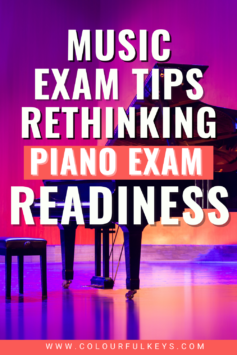Here in Ireland, most piano students take exams just by default. In other parts of the world, such as the USA, taking music exams is much less common.
Why is that? Are children’s learning styles different in different countries?

I doubt it. I tend to think that both “default” approaches are wrong.
Exams shouldn’t be prescribed for every student in a studio or – on the flip side – no students at all.
We should make the decision on a case-by-case basis, just like we tailor our teaching methods and styles for each individual student.
One of the amazing benefits of teaching private lessons is that we can adapt to the student’s needs. We don’t need to teach an entire classroom full of diverse personality types and learning needs.
So, how about we wipe the slate clean, and think about the student sitting in front of us?
The content in this article was first published in October 2015 and May 2018, then updated in December 2022.
To test, or not to test?
Let me start by saying this: Piano exams are only motivating for students who are already consistent practisers. If your student has very poor practice habits, preparing for an exam is only going to cause panic. These students tend to get low exam marks, making them even less motivated.
Sorry to be the bearer of bad news, but exams are not a magic practice cure.
So that leaves our star practisers. Even here, piano exams shouldn’t just be assumed. There are still several angles to consider when thinking through both sides of the piano exam debate.
Let’s look at two examples to help you sort through all the noise.
Technical Skills Motivation
George loves piano. He takes any and all opportunities to play his pieces for others and looks forward to the recital at the end of every year. He’s quite competitive and responds well to challenges with specific, defined goals such as timed flashcard games or the 40-Piece Challenge.
However, it can be tricky to get George to focus on scales, technique and sight reading, and it’s like pulling teeth to get him to do his theory assignments. He just doesn’t see the value in something no one gets to hear.
Exams could be an excellent motivator for George. The challenge of getting a good result could be just the thing he needs to focus on aspects of piano outside of just the repertoire.
Performance Anxiety Overload
Fred loves the piano, too. He spends hours every week practising, and really enjoys the feeling of completing an assignment. Recitals are a tough time of year for Fred, though. He’s happy enough when a performance is over, but he gets very nervous playing in front of others.
I would not recommend exams for Fred. They would simply add an unnecessary level of stress for an already diligent student.
Other goals would be much more appropriate – ones that allow him to feel safe and supported in his music-making, such as working through a composing project or recording a video compilation of his best pieces.
Is it the right time?
Now that we’ve identified all the Georges, it’s time to take a fresh look at that ever-elusive question:
When is a student ready for a piano exam?
Is it when we know they’re capable of passing the exam? Is it when they’ve already learnt some pieces at the same level as the exam repertoire?
Is it only when it’s been a year since their last exam?
When I put it like that, surely not. But that’s essentially how many parents and many of us teachers (myself included, in the past) act when considering piano exam readiness. It’s assumed that a student will do grade 2 this May if they sat grade 1 last May.
But should they? And are they really ready?
Piano Exam Readiness Assessment
Your gut.
That’s the number 1 piano exam readiness assessor. Please, please, trust it.

Now, when your gut isn’t sure (or needs bolstering,) here are some questions you can ask yourself about the student in question:
- Have they successfully learnt any pieces at around this level of technical difficulty?
- Can they sight read fluently at about two grades below this exam level?
- Do they already know all (or at least most) of the scales required for the exam?
- Can they name or explain most of the theory terms that would come up at this level?
- Could they get about 80% of the aural tests correct without your help or preparation?
That’s a tough list, and it’s really just a starting point. But for me over the years, it all boils down to one question:
- Can I see this student realistically getting a great result in this exam with 3 months of preparation time?
If the answer is “probably not,” then they’re not ready. It’s really as simple (and as complicated) as that.
If the answer is “yes, mostly,” then the student is probably ready to sit for the exam – but does that automatically mean they should?
The Broader Picture
Let’s zoom back out. You’ve looked at the details of this particular exam and how ready your student is for each component – but how does sitting for the exam fit into the big picture?
Saying yes to one thing is saying no to something else.

In the case of an exam, saying yes means saying no to other skills you could teach them during that time and other pieces they could have learnt.
That’s not necessarily a bad thing. If the exam brings you closer to achieving what you want to achieve for your students, then fantastic!
But does it?
To think about that question, you need to first know what you want for your students. When you know where you’re headed, you should be able to think through whether this exam will bring your student further down the path, or whether you could get there faster without it.
Enriching Experiences
This ties into both the considerations above.
What is this experience going to be like for the student? If it’s too easy it’s not going to be enriching – nor will it if it’s too hard.
And there’s something extremely enriching missing from many exam-led educations: exposure to enough repertoire.
My goal is for my students to get through about 35 pieces, at varying levels, in between two exam grades. Before that’s happened, I don’t want to entertain the idea of the next exam because their experience is simply too narrow, and an exam will make it narrower. Students who have only worked through, say, 25 pieces automatically fail my piano exam readiness assessment.
If they have learnt that amount of repertoire, though, that’s when it can be beneficial and musically enriching to slow down a bit, whether that’s to prepare a special recital piece, work on an in-depth composition or sit an exam.

What’s your mark of readiness for piano exams?
Did any of the factors I mentioned surprise you? Let me know your thoughts in the comments or in the Vibrant Music Studio Teachers group on Facebook.
For more info on broadening repertoire or preparing for exams, hop on over to my Planning Lessons hub page.
Wow, Nicola, great article and just what I needed! I have a couple of students that are beginning to ask about exams (or rather, their parents are!). You’re article gave me some good reasons to resort to. And I really like what you said about the repertoire they need to experience in between exams… I’m looking forward to the other articles in the series.
Glad you enjoyed it Karissa. I hope that these posts will give you the confidence to choose exams when they’re right for your students, not when they “should” happen.
Wow, Nicola, great article and just what I needed! I have a couple of students that are beginning to ask about exams (or rather, their parents are!). Your article gave me some good reasons to resort to. And I really like what you said about the repertoire they need to experience in between exams… I’m looking forward to the other articles in the series.
Whoops, tried to correct a typo and posted that twice! 😛
Thanks Nicola. I’m at the thinking stage about exams for a few students. One thing that I do find difficult with exams is the concentration on limited repertoire – children can get to Grade 8 and have played very few composers/standard repertoire. Saying yes to exams often means no to lots of exploration. It can often suck the life out of lessons – so many things you have to get through with your student. It has to be a well-considered decision.
Definitely. But I also think we need to stop saying yes to exams and start saying yes/no to just one exam at a time. It doesn’t have to be all or nothing.
Thanks for this; good food for thought for me today. I have a student who loves the process of preparing for an exam, but I am finding that her exposure to other composers and repertoire is limited…as well as being able to explore other skills (like improvisation, reading lead sheets, etc.)! Here in Canada, students can earn high school credit if they complete a certain level of exams; this particular student’s parents are hopeful she’ll earn those credits…but at this point I am becoming doubtful that she will make it to that level. It’s a terrible reason to take exams, in my mind! I’m not sure how to bring it up with her parents…something I’ve been avoiding, but need to address before too late.
Yes, you need to tackle it head on in my opinion. It’s great that she’s motivated to practice when prepping for an exam, but is that really the primary reason why she’s learning music? To get a credit? I’m sure if you ask them point blank the answer will be “NO!” and you can go from there.
Thanks for this Nicola! I usually have students that want to do an exam every year especially those are are working towards getting credits for high school. Some I do believe need to be working a little longer at a certain level to learn more technique and more songs as well as improvising. Maybe I need to even rethink about this as students get to the intermediate levels as well.
I think often we need to think about dipping in and out of exams too. There’s nothing (in our exam boards at least) to stop a student doing grade 2 and then 2 and a half years later doing grade 4, and this might take away some of the sour taste of not doing the next exam the next year.
Exams certainly helps them to reach a bar and pushes them forward. But I do like idea of broaden the scope of music in between their exams. The younger levels seem to have much more choice and availability of songs to choose from. Its the intermediate and advanced levels that seem a bit harder to narrow down fun and exciting choices. Maybe I just don’t know where to look. I have run into parents who want to skip levels and push the exams when they just need to play for fun and learn technique. Thank you for this advice to think past the bar and find some fun in the journey.
Do you mean for in between exams? There’s certainly lots of great rep for intermediate and advanced students too! At that stage it’s great to give them choice. Put together a YouTube playlist of options and see where their musical tastes lie.